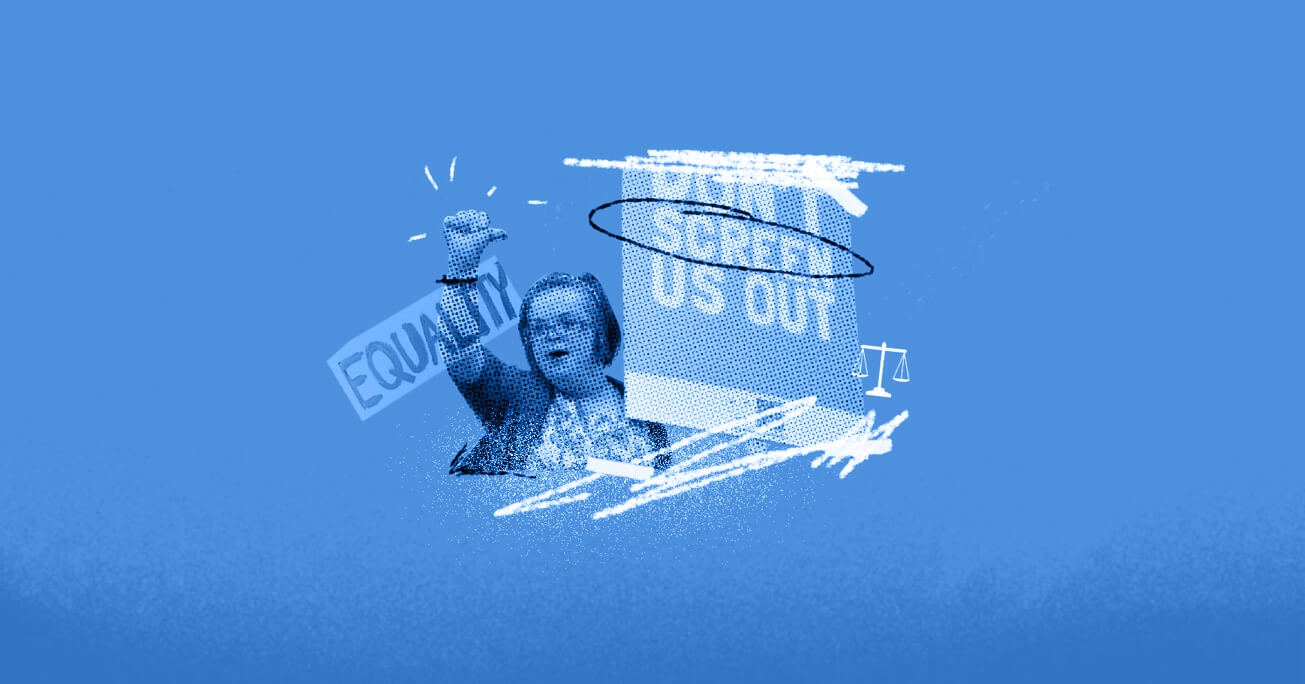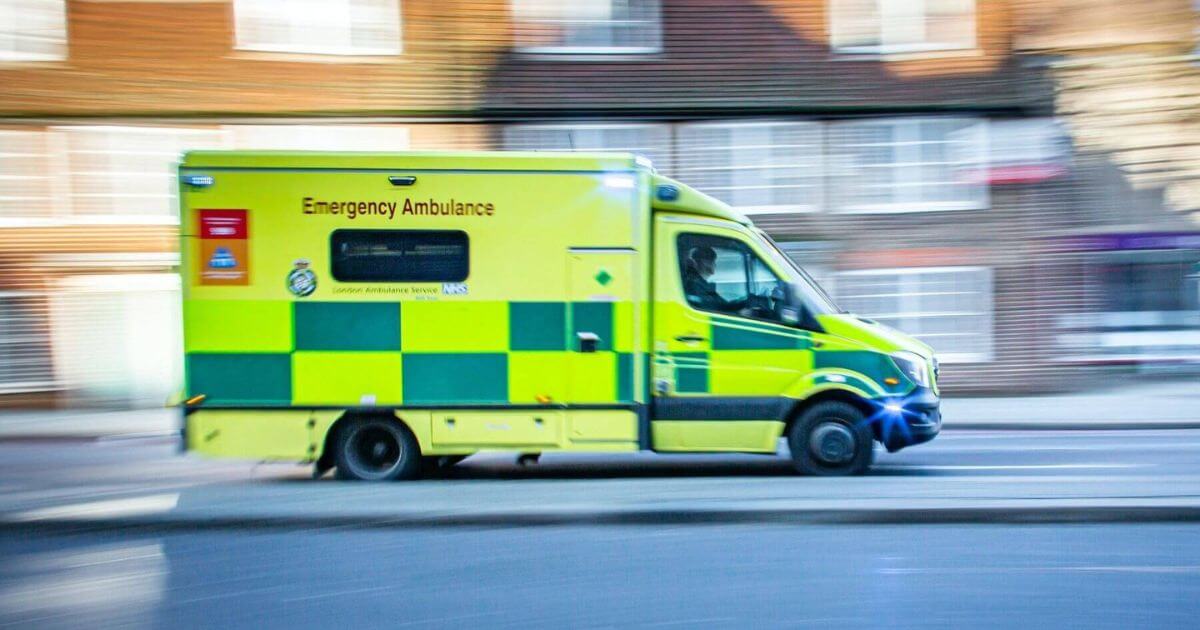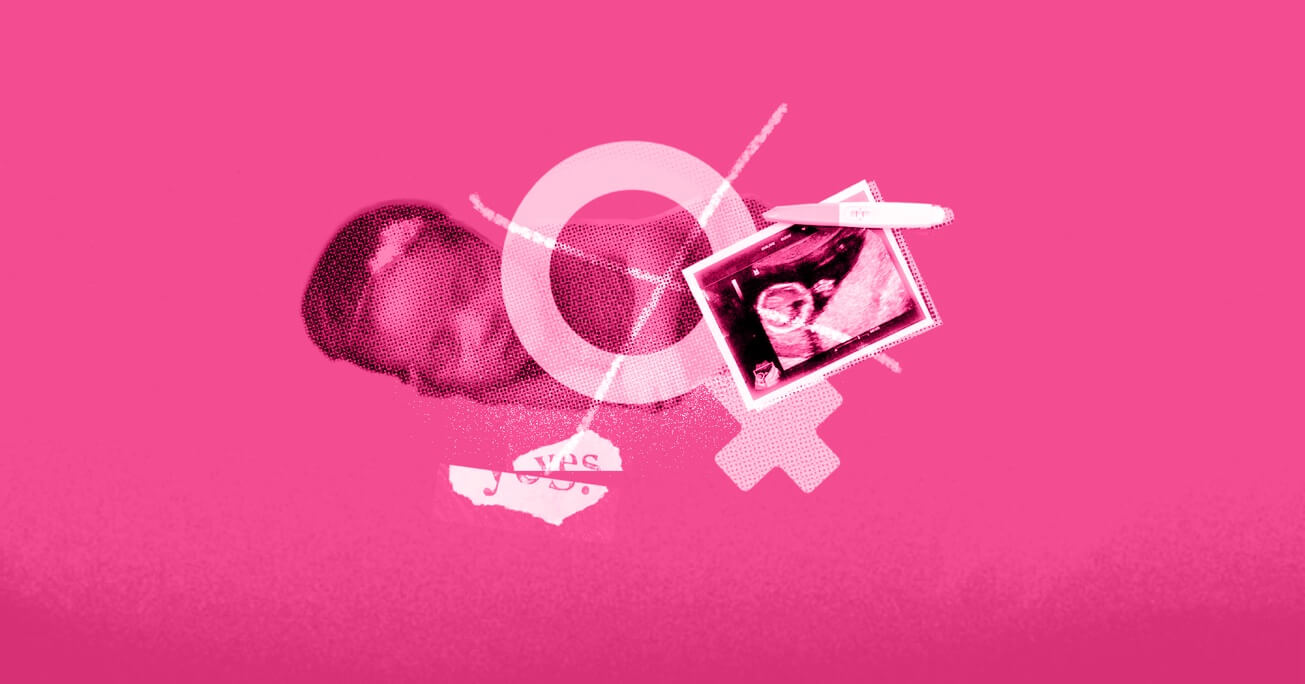What is disability-selective abortion?
In general, a selective abortion is an abortion in which a particular unborn baby is thought to have some characteristic that is perceived as undesirable and is aborted because of that particular characteristic.
- A disability-selective abortion takes place when an unborn child is thought to have a disability and is aborted because he/she has a disability.
A disability-selective abortion can be compared to other kinds of selective abortions such as sex-selective abortion in which an abortion takes place because the child is an undesired sex; and selective-reduction abortion, in which an abortion takes place to “reduce” the number of babies.
Is disability-selective abortion legal in the UK?
Yes. Abortion on the grounds of disability is legal through all nine months of pregnancy in every part of the UK.
The Abortion Act 1967 provides a number of grounds under which abortion is legal. In regard to disability-selective abortion, Section 1(1)(d) of the Act states abortion is legal when:
“There is a substantial risk that if the child were born it would suffer from such physical or mental abnormalities as to be seriously handicapped”.
The phrase “seriously handicapped” is interpreted extremely broadly, and in practice, this is interpreted by doctors to include conditions such as Down’s syndrome, cleft lip/cleft palate or club foot.
Disability-selective abortion is available up until birth
- In abortions where the child is not prenatally diagnosed with a disability, and where the life or health of the child’s mother is not threatened, abortion is legal up until 24 weeks gestation. In cases of a disability-selective abortion where a child is prenatally diagnosed with a disability, abortion is available up until birth.
- Section 1(1)(d) is unique among the current grounds for termination in that it does not require that there be any risk of injury to the mother or any existing children in her family. Instead, the focus is solely on the ‘risk’ of the baby having a disability.
Disability abortion law in the UK might conflict with non-discrimination law
- In 1995, Parliament passed the Disability Discrimination Act. This Act made it a legal offence to discriminate solely on the basis of disability, with discrimination being described as the following: “A person directly discriminates against a disabled person if, on the ground of the disabled person’s disability, he treats the disabled person less favourably than he treats or would treat a person not having that particular disability whose relevant circumstances, including his abilities, are the same as, or not materially different from, those of the disabled person”.
- On 30 March 2007, the United Kingdom signed up to the UN Convention on the Rights of Persons with Disabilities, and ratified this convention on 8 June 2009. Article 10 of this convention is titled the “Right To Life” and states, “States Parties reaffirm that every human being has the inherent right to life and shall take all necessary measures to ensure its effective enjoyment by persons with disabilities on an equal basis with others”.
- The Equality Act was passed by parliament in 2010. In Chapter 1, Section 6, disability was listed as a protected characteristic within the Act. Chapter 2, Section 13 (1) describes discrimination, including discrimination against those with disabilities, as when “A person (A) discriminates against another (B) if, because of a protected characteristic, A treats B less favourably than A treats or would treat others”.
- The UN Committee on the Rights of Persons with Disabilities has recommended the UK update its law on abortion to reflect adherence to the spirit of this convention, specifically suggesting they amend abortion legislation to clarify abortion should not be legal for disability reasons.
- The Disability Rights Commission (the predecessor to the Equality and Human Rights Commission) have said this aspect of the Abortion Act: “is offensive to many people; it reinforces negative stereotypes of disability… [and] is incompatible with valuing disability and non-disability equally”.
- The Disability Discrimination Act 1995, the Equality Act 2010, as well as the ratification of the UN Convention on the Rights of Persons with Disabilities, are all in apparent conflict with the existing abortion law in the UK, since abortion is permitted up to birth if the baby in the womb is diagnosed with a disability, but not if the baby in the womb is not.
Statistics: how many babies with disabilities are aborted per year?
In 2021, there were:
- 3,370 disability-selective abortions under Ground E in England and Wales.
- There have been at least 3,000 abortions in England and Wales due to disability every year since 2014.
- A 2014 Department of Health review found evidence that there is significant under-reporting of the number of abortions for some fetal disabilities. These numbers are therefore likely to be significantly higher.
- 859 abortions where the baby has been prenatally diagnosed with having Down’s syndrome.
- According to a Telegraph report, “the number of babies aborted in 2010 for Down’s Syndrome was double that recorded officially – 886 compared to 482”.
- 40 abortions took place where the baby had cleft lip/cleft palate.
- The figures are likely to be much higher – for example, a 2013 review by Eurocat showed 157 babies with cleft lip and palate were aborted in England and Wales between 2006 and 2010. However, the DoHSC recorded only 14 such abortions.
Further information on the 2021 abortion statistics is available here.
Further on abortion statistics is available here.
The introduction of non-invasive prenatal screening (NIPT) in the UK has coincided with an increase in abortion on the basis of a prenatal diagnosis of Down’s syndrome.
A study found that the number of infants born with Down’s syndrome in the UK fell by 54% between 2011 and 2015, a period that saw the arrival of NIPT in the UK in 2012.
Public opinion on disability-selective abortion
Polling shows that there is support for changes to current legislation that currently allows disability-selective abortion to take place right through to birth in the UK.
- Polling from Savanta ComRes shows that only one in three people think it is acceptable to ban abortion for gender or race but allow it for disability.
- Another poll of over 2,000 British adults from Savanta ComRes showed that, excluding those who responded ‘Don’t know’, 59% support “a change in law that would introduce an equal time limit for disability abortions of 24 weeks”.
Ethical and legal considerations of disability-selective abortion
Discrimination
One of the main ethical and legal concerns with disability-selective abortion is the fact that it actively and unjustly discriminates against people with a disability.
Legally, there appears to be a serious conflict between the Abortion Act, which permits abortion up to birth for babies with disabilities but not for babies who do not have disabilities, and other legislation that does not allow discrimination on the grounds of disability (see above).
Morally, there is a clear injustice in treating people with disabilities in this radically different manner from other people who do not have disabilities.
The disability-selective abortion provision in the Abortion Act, means that individuals with disabilities are not entitled to the same protection in law as individuals without disabilities. This is a form of arbitrary and unjust discrimination against such individuals.
Judgements about the value of life
It is not the job of the law to make judgements about the value of individuals’ lives. The Abortion Act allows medical professionals to end the lives of babies in the womb in general, and babies with disabilities, in particular, in a more radical way. In effect, the abortion law assumes that some lives are less worthy of protection than others, presumably because they are viewed as less valuable.
In particular, current abortion law creates a situation where the lives of babies with disabilities are less valued than other babies’ lives, precisely because those babies have disabilities, and therefore allows medical professionals to end their lives up to birth.
Disability-selective abortion perpetuates harmful and negative stereotypes about people with disabilities
Making abortion legal up until birth for babies with disabilities but up until 24 weeks for babies without disabilities perpetuates the idea that there is something especially bad about having a disability or even about people who have disabilities.
The law implies that people with disabilities should be treated differently and should be subject to different standards than people without disabilities. The abortion law implies that an abortion at nine months because the baby has a disability is morally acceptable, presumably because of the perceived burden that the baby in question might pose for his or her parents.
Disability-selective abortion and eugenics
There is some concern that abortion solely on the grounds of disability is a form of eugenics, whereby the human population is “improved” by the elimination of “undesirable” characteristics. However, whatever other issues there might be with eugenics in general, in relation to abortion, the “undesirable” characteristics, such as having a disability, are only eliminated by ending the life of the unborn baby with that characteristic.
This has become an acute concern in relation to the introduction of Non-Invasive Prenatal Testing (NIPT).
In 2020, A Chinese biotech firm, the BGI Group, which offers NIPT to diagnose Down’s syndrome, declared “screening out” babies with Down’s syndrome a “cash cow” funding the growth of the whole business.
A spokesperson for the group said: “…with the use of our technology, [the BGI Group] could avoid the birth of birth defect, like a Down’s syndrome birth, a Down’s syndrome child, we can screen them out, we can avoid the birth of them”.
Prenatal disability diagnosis and the pressure to abort
There are numerous personal stories from women who, after receiving a prenatal diagnosis of fetal disability, were put under pressure to have an abortion, often by medical professionals themselves.
- While much of the evidence is anecdotal, the phenomenon is frequent enough that in 2020, the Royal College of Obstetricians and Gynaecologists (RCOG) joined with the Royal College of Midwives and the Society and College of Radiographers to release guidelines emphasising the importance of a non-directive approach to prenatal screening for Down’s syndrome, Edwards’ syndrome and Patau’s syndrome.
- The guidelines stress throughout that the results of prenatal testing should be given and discussed in a “non-directive” manner, such that, whether a test indicates that a baby has Down’s syndrome or not, no parent should feel pressured into a decision about whether or not to have an abortion.
- The emphasis on a non-directive approach occurs within the context of some parents who decide they do not want an abortion “being asked repeatedly if they want further diagnostic tests or an abortion”.
- “[These parents] report having their decisions challenged and being pressured into changing their minds”. The guidelines state: “This should not happen”.
- “Parents should have the scope to change their minds, but not be pressured into doing so – their decisions should be accepted and respected at all times”.
Personal testimony from mothers who were put under pressure to have an abortion because their baby had Down’s syndrome
Lorraine and Jaxon’s story
Jaxon is described as “a little comedian” with a “really cheeky” sense of humour. He’s a typical six-year-old who happens to have Down’s syndrome.
Because Lorraine was 45 when she was pregnant with Jaxon, she was persuaded to have additional screening. But Lorraine couldn’t understand why everyone was so negative.
The sonographer explained that if the baby showed markers that indicated that her baby had Down’s syndrome, the next step would be an amniocentesis, a test that carries a small chance of a miscarriage.
“I said no, we wouldn’t be interested, partly because we had lost a baby the previous year. She was very aggressive and said ‘women like you make me sick. Why bother having a screening at all if you’re not going to do anything about it?’”
A midwife later phoned, saying she was “ever so sorry” but had “really bad news”, confirming the baby had a one-in-five chance of having Down’s syndrome.
Lorraine said: “The support was only there if I chose to have an abortion, and that was what they presumed, but they weren’t interested when I said I wanted to keep Jaxon”.
Her son was diagnosed at birth and Lorraine says the family has never looked back. She says her other children adore him and will fight over who gets to look after him when they are older.
“I want him to get married and work and have a normal future. We know he will always need support but we really believe he will lead a full life. He’s a showman, a real entertainer and we think he will end up on the stage”.
Emma and Jaimie’s story
Emma Mellor was under pressure to have an abortion from the moment her doctors realised that her daughter was likely to have a disability after a 20-week scan.
“In all honesty we were offered 15 terminations, even though we made it really clear that it wasn’t an option for us, but they really seemed to push and really seemed to want us to terminate”, she says.
At the same time as Emma was pregnant with Jaimie, her son Logan was on the waiting list for surgery, having been born with a hole in his heart. Emma said she could not imagine ending their daughter’s life with an injection in the heart to stop it beating – the normal abortion method after 22 weeks – while they were waiting to fix their son’s.
At 32 weeks, a test confirmed that Jaimie had Down’s syndrome and doctors reminded Emma multiple times that she could be legally aborted until birth.
“At 38 weeks, the doctors made it really, really, really clear that if I changed my mind on the morning of the induction to let them know, because it wasn’t too late”.
“I was told that until my baby had started travelling down the birth canal, I could still terminate”.
Emma refused every offer of an abortion and Jaimie was born with Down’s syndrome and otherwise perfectly healthy. Five years later, Jaimie is a happy child in mainstream education.
“She loves dancing and trampolining. She has a few difficulties but she is just like any other child her age. She lights up the room and people just gravitate towards her”.
Support for parents who have an unborn baby who has been diagnosed with a disability
There are a number of organisations and groups that provide information and support for parents who have an unborn baby who has been diagnosed with a disability.
- Positive About Down Syndrome – this organisation provides information and support to parents at every stage of their journey from diagnosis through to birth and beyond. Along with the helpful information they provide on their website, they also run Facebook groups for parents who are expecting (Great Expectations Group) and parents who have given birth (New Parents Group). They also produce the excellent book #NobodyToldMe which includes a collection of experiences written by young people with Down’s syndrome, their friends and family.
- Down’s Syndrome UK – this website includes a map with links to Down’s syndrome support groups throughout the United Kingdom.
- Down’s Syndrome Research Foundation – this organisation is a research-focussed charity. They have useful information on their website about Down’s syndrome, diagnosis and pregnancy.
- Every Life Counts – this is an Irish-based group, but they are happy to provide support and information for parents outside Ireland and connect them with parents in their area. They work with parents who have received a diagnosis of a condition a life-limiting condition that is likely to be terminal. They also run a 24-hour helpline and a place for parents to share their stories.
- NHS webpage on Down’s syndrome – The NHS website includes a helpful video featuring three families who share their experience of having a child with Down’s syndrome.







